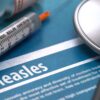Of the 8,848 Alabamians known to have contracted COVID-19 more than once as of Friday, 87 percent were unvaccinated, the Alabama Department of Public Health tells APR.
Those numbers, while they don’t tell the entire picture, are still critical data that demonstrates the importance of vaccination even for those who have already been infected, Dr. Ellen Eaton, an assistant professor of infectious diseases, said.
“As of today, we have identified a total of 8,848 people who were infected with COVID-19 more than once. Out of these, only 13 percent (1,119) were fully vaccinated,” wrote Ramandeep Kaur, the epidemiologist supervisor with the Alabama Department of Public Health’s Infectious Diseases and Outbreaks Division, in a response to APR on Friday.
Eaton told APR that one of the most recalcitrant myths of the pandemic is that COVID infection, even once, leads to lasting immunity, noting that infectious disease physicians questioned that myth early on “because we know other coronaviruses may present as common colds and infection with one cold does not provide ‘immunity’ against future colds.”
“And for those of us who see patients, we know that patients began to develop reinfection early in the pandemic,” Eaton said. “By the Summer of 2020, we were already seeing COVID reinfections particularly in front line workers and healthcare providers, and these re-infections generally occurred 3 months or more after the first COVID-19 infection. Reinfections can be quite severe, even fatal. For this reason, we strongly recommend vaccination even for those with prior infections.”
The ADPH data on the percentage of vaccinations among the reinfected is limited. It’s unclear how many of the reinfected were eligible for vaccines – children under 12 still aren’t eligible – and hospitalization and death data are lacking, Eaton said. She urged the community to get vaccinated to help protect those younger children from one or more COVID infections.
“It’s also important to note that this data is limited to those who get tested, a number that is estimated to be a fraction of those who are actually infected (but do not test),” Eaton said. “But it is consistent with our clinical observations and other public health reports: natural immunity is limited, imperfect, and certainly inferior to vaccination. We can’t rely on immunity from prior infections if we want to stay well.”
ADPH’s data on reinfections is consistent with findings out of Kentucky which showed that unvaccinated people were more than twice as likely to be infected with COVID more than once, compared to the fully vaccinated, Eaton noted.
That ADPH data also leaves other unanswered questions, which Eaton explained are important to understanding the overall impact of COVID.
“How many of these reinfections led to household and community spread, how many reinfections led to missed work, missed school, missed paychecks, how many reinfections led to urgent care visits, costly co-pays, hospitalizations and worse,” Eaton said.
Newly reported COVID cases to the Alabama Department of Public Health have been falling in recent weeks. The state’s seven-day average of new reported daily cases fell to 1,076 on Sunday, a 53 percent drop from two weeks ago. Those cases represent new cases reported to ADPH and not the date on which the cases occurred.
{{CODE1}}
The number of hospitalized COVID patients has been falling as well. As of Monday, there were 920 hospitalized with the virus statewide, according to the Alabama Hospital Association, a 37 percent drop from two weeks before.
{{CODE2}}
Of those 920 patients, 78 percent were unvaccinated, according to the association. The state’s ICU bed capacity was at 88 percent on Monday, and 28 percent of all ICU patients had COVID.
Alabama State Health Officer Dr. Scott Harris told reporters Friday that while the drop in cases and hospitalizations is promising, the state’s COVID death toll continues to mount. There have been 14,869 confirmed COVID deaths in Alabama, according to ADPH, which means one in 330 Alabamians have died from the virus.




















































